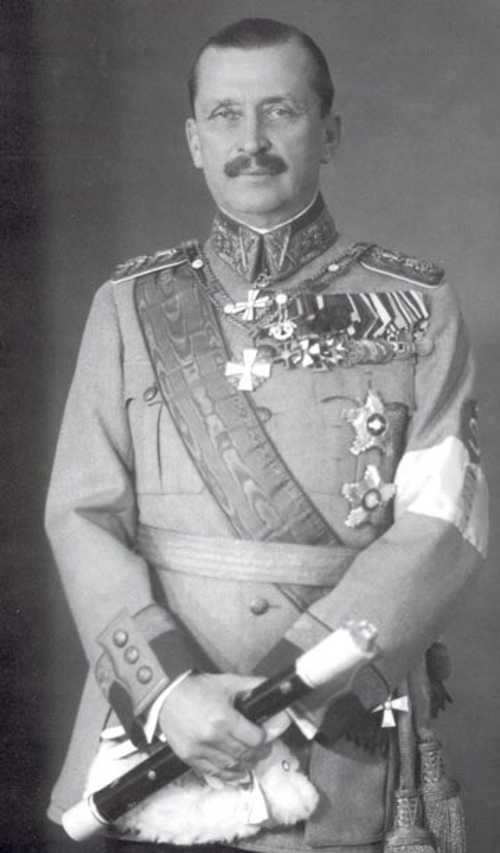
Finnish Forces
C. G. E. Mannerheim
Carl Gustaf Emil Mannerheim(1867–1951) General of Czar Nicholas II, Marshal of Finland, supreme commander of Finnish armed forces during WWII and president of Finland 1944–1946. Mannerheim's military career started in 1887 in Nicolas Cavalry School, in Russia. From where he graduated with excellent grades in 1889 and the career in Russian cavalry continued untill 1917. During his service he fought in the Russo-Japanese war and in World War I, on Astro-Hungarian and Romanian fronts. During that time, he achieved the rank of Lieutenant General. When mannerheim returned to Finland, it had become independent on December 6, 1917. And soon the Civil War between red and white troops begun. Mannerheim was made the commander of the white army, which had been declared as the legal army of Finland. Mannerheim saw the war as part of larger communist revolution and part of the World War. He was anti-bolshevik and therefor felt the war against the Finnish red guard as battle against the bolshevik government of Russia. After the victorious war, Mannerheim remained very respected person with lots of influence in Finland, through 1920's and 1930's. He could have easily used his popularity to gain power to himself within the country, but he didn't want that. He stayed out of politics and didn't give his support to any political party. During the interwar years, Mannerheim's pursuits were mainly humanitarian. He headed the Finnish Red Cross and founded the Mannerheim League for Child Welfare In 1930's Mannerheim saw the new great war coming, he kept demanding for more funding for the defence forces and in 1938, the government agreed for some basic things to be bought. This wasn't even nearly enough so he complained that the defence forces still had lack of everything. And in 1939 it would have been possible to buy weapons from the United States, but this was rejected by the government. At the end of the same year, the Winter War begun. The same day President Kallio made him the supreme commander of the Finnish defence forces. He addressed his famous first "order of the day" to the Defence Forces on the same day the war began: "The President of the Republic has appointed me on 30 November 1939 as supreme commander of the armed forces of the country. Brave soldiers of Finland! I enter on this task at a time when our hereditary enemy is once again attacking our country. Confidence in one's commander is the first condition for success. You know me and I know you and I know that everyone in the ranks is ready to do his duty even to death. This war is nothing other than the continuation and final act of our War of Independence. We shall fight for our home, our religion, and our country." After Winter War, in 1941,Before the Continuation War, the Germans offered Mannerheim command over German troops in Finland, around 80,000 men. Mannerheim declined so as to not tie himself and Finland to Nazi war aims. He kept relations with Hitler's government as formal as possible and successfully opposed proposals for an alliance. If Mannerheim had not also firmly refused to let his troops participate in the Siege of Leningrad, they would have ended up becoming an integral part of said siege. Mannerheim's 75th birthday, on 4 June 1942, was a major occasion. The government granted him the unique title of Marshal of Finland(Suomen Marsalkka). A surprise visit by Hitler in honour of Mannerheim's birthday was less pleasing to him. In June 1944, the Finland's defence is collapsing. To ensure help from Germany, President Ryti signs the Ribbentrop agreement with Germans. But in August after the major defence victories, the situation gets more stable and there was no need for the agreement anymore. Ryti resigns and Mannerheim is made the president of Finland. He broke the agreement which Ryti had made, and accepted armstice with the Soviets. Mannerheim was troubled by recurring health problems during 1945, and was absent on medical leave from his duties as president from November until February 1946. He spent six weeks in Portugal to restore his health. After the announcement of the verdicts in the war crimes trials were announced in February, Mannerheim decided to resign on March 4, 1946. He believed that he had accomplished the duties he had been elected to carry out: The war was ended, the armistice obligations carried out, and the war crimes trial finished. He died on January 27, 1951. "Fortifications, cannons and foreign support won't help, if every man doesn't know that it's just him that stands as a guard of his country." - Mannerheim
4142 Views
12/12/2010
